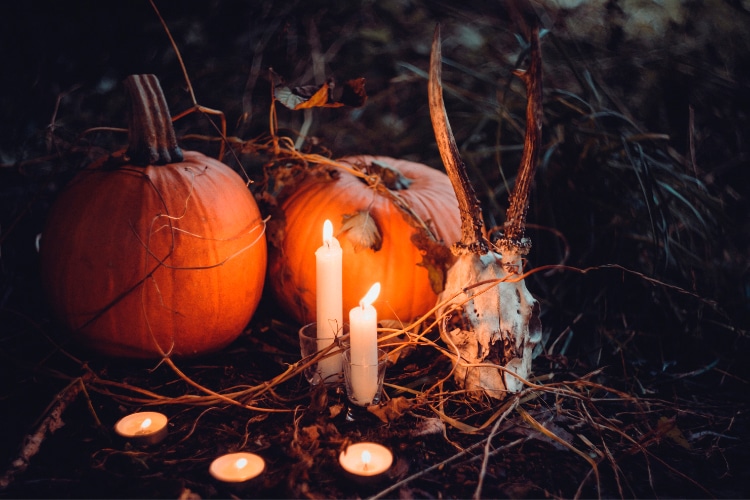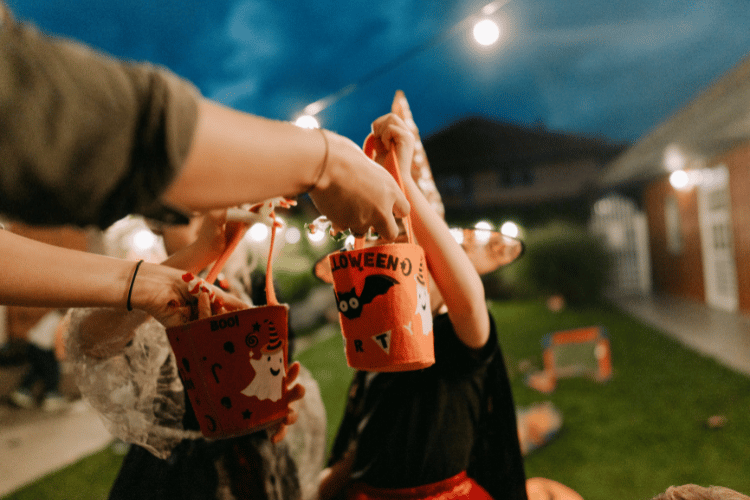Last Updated on October 20, 2025 by Maryam Siddiqui
Halloween fans in Portugal will not be disappointed when they move here! The sunny southern European country hides frightening traditions on the 31st of October. In this article, learn about the main traditions celebrated for Halloween in Portugal and how you can enjoy them.
See where there’s space for scares, tricks, and treats in Portuguese cities. Keep reading till the end to know the best activities to do around this time and have fun like you’re young again!
Is there Halloween in Portugal?
Contrary to what many people think, Halloween is not just an invention of the United States. Long before the country existed, October 31st was already celebrated in European countries.

Halloween in Portugal, however, was not the date to dress up and eat sweets. The country has known All Saints’ Day traditions for centuries, and even before Christianity, with the Samhain of the Celts, there was also a special cult reserved for the supernatural.
Although nowadays Portugal’s trademark images are of sunny days, the age of navigation and good food, the interior of the country has more obscure traditions.
- If this season is your favorite, check out our article Fall In Portugal: See What Autumn Is Like And The Best Things To Do to discover all the fun activities around these months!
Portuguese Halloween traditions to celebrate
Discover the Portuguese traditions of the 31st of October that have been passed down from generation to generation and are still alive today.
Festa da Cabra e do Canhoto – Bragança
Locally known as the Celtic dark season festivities, Halloween in Portugal is also celebrated near Bragança, in the northeast of the country. The Village of Cidões is home to one of Halloween’s scariest traditions.
The Festa da Cabra e do Canhoto, translating to Festival of the Goat and the Demon, is what’s left of a tradition of the Celtic people who inhabited the region hundreds of years ago.
To celebrate the end of the clear seasons of the year, on a night when supposedly the energies of nature communicate, a huge bonfire is lit. In it, the devil is burned, and his wife, the goat, is cooked.
As part of the festival, a goat is served for dinner, accompanied by medieval music and Celtic dances.
Night of the witches in Vilar dos Perdizes – Montalegre
The tradition of Halloween in the far north and interior of Portugal is one of the most alive to this day. Every Halloween night, the 400 inhabitants of Vilar de Perdizes hold a big traditional witch-burning festival.
At the festival where torches are lit, and witches dance until the priest burns them, Portuguese Halloween shows its best.
This is the occasion for the greatest tourism in the small village of Vilar de Perdizes, Montalegre parish, almost in Spain. However, the origin of the tradition, as said by the Portuguese newspaper Publico, comes from burning witches to ward off evils.
Definitely a party that arouses the curiosity of Halloween lovers in Portugal. Therefore, not to be missed! Fortunately, the party is also repeated every Friday the 13th of every year. Calm down; nowadays, no witches are burned anymore. But it’s a good time to get to know the region and its cuisine.
All Saints’ Day in Portugal
All Saints’ Day is widely celebrated with the same supernatural air, even more than Halloween in Portugal. Or rather, remembered.
November 1st is known as the Day of the Dead when the Christian Portuguese remember the relatives who have already died.
It’s similar to Mexican and Latin culture, in general, that visit cemeteries and leave flowers on the graves of loved ones. However, there is no dancing or partying. This is a mournful day of sadness and silence to remember those who are gone.
Let’s Move to Europe
With Viv Europe your plans for Europe will come to a reality
Pão Por Deus in All Saints’ Day
A Portuguese tradition from the Halloween period that is very similar to the American trick or treats is the Pão Por Deus, or Bread, For God’s Sake. Asking for treats door-to-door has been a custom in the country’s central region, as in Coimbra, for decades.
The tradition of Bread For God has been maintained and evolved over the years, up to what we have today. According to tradition, children knock on the door and ask for bread while reciting cute little verses of a song, such as:
| Bolinhos e bolinhós Para mim e para vós, Para dar aos finados Que estão mortos e enterrados À bela, bela cruz Truz, Truz! A senhora que está lá dentro Sentada num banquinho Faz favor de s’alevantar Para vir dar um tostãozinho. | Cakes and bread For me and for you, To give to those who died Who are dead and buried To the beautiful, beautiful cross Knock, knock! The lady inside Sitting on a stool Please just stand up To come and give me a penny. |
In exchange, people usually give children bread, cakes, pomegranates, nuts, and so on. So, they put them in their special cloth bags for the date and, after singing a thank-you song, go to the next house.
| Esta casa cheira a broa, Aqui mora gente boa. Esta casa cheira a vinho, Aqui mora um santinho. | This house smells like bread, Good people live here. This house smells of wine, Here lives a little saint. |
However, if the children don’t get the treats they asked for, they sing a cursing song.
| Esta casa cheira a alho, Aqui mora algum bandalho. Esta casa cheira a unto, Aqui mora algum defunto. | This house smells of garlic, Here lives some rascal. This house smells of grease, Here lives someone dead. |
What’s scary about asking for bread?
But what gives this Portuguese Halloween tradition a scary touch is that children used to take with them a pumpkin with cut eyes lit by a candle while asking for bread at the beginning of the last century.
Sometimes the pumpkin would go into children’s heads, like Jack-o’-lantern. A group of children like this in the middle of Portugal on the night of the dead can indeed be scary.
It seems that Halloween already existed in Portugal after all, isn’t it?
Portuguese vocabulary for Halloween
Knowing these words isn’t important at all, but it adds a bit of fun when you’re trying to settle in with the new culture here. It’ll also be nice for your kids to know some of these words when they go out for trick or treating.
Enjoy this fun vocabulary:
- Halloween – Dia das Bruxas
- Costume – Fantasia
- Trick or Treat – Doçura ou Travessura
- Candies – Doces
- Ghost – Fantasma
- Pumpkin – Abóbora
- Boo! – Vaia!
- Decoration – Decoração
Can I still take my kids trick or treating?
Depending on the neighborhood you live in, you may be able to bring children trick or treating in Portugal. In some places in Lisbon, you can already see houses decorated for Halloween.
This is because the younger generations have had contact with American culture from an early age through movies, series, and also social media. Soon, Portuguese children begin to develop in their culture an American-style Halloween, knocking on door-to-door asking “Doçuras ou Travessuras?”.

The ideal thing to do is meet other neighboring families and see if anyone plans to celebrate Halloween like that. Facebook can also be a good source of information about this.
But remember, it’s important to celebrate your culture abroad, of course, but also make room for Portuguese culture to come into your home. It’s a beautiful feeling when you can co-celebrate two unique cultures!
Take a look at our article What Americans Need To Know About Portugal for more insights if you’re an American expat relocating here.
What do kids like to do during Halloween in Portugal?
Of course, since they’re kids, there isn’t one single way they could enjoy the holiday. Some kids may enjoy taking part in trick or treating and dressing up, while others may prefer sitting at home watching their favorite cartoons, and that’s okay.
Most kids do enjoy the dressing up part of it; some families also like to host themed parties for their kids’ friends to have fun together. You’d see that there are more dressed-up youngsters in Lisbon and Porto than in other regions, mainly because there are more expats in those two cities.
Ask your kid what they’d like to do and maybe take them to a kid-friendly Halloween party and disco! Alternatively, perhaps you could host one too and invite your neighbors to a nice potluck dinner.
What do adults like to do during Halloween in Portugal?
Quite a few parties are held annually for adults looking for entertainment on Halloween. For those that don’t have any kids they need to accompany or help dress up, parties are a great way to get out there and have fun!
But hey, you can be a parent and still join in for all the excitement.
Many adults love to decorate their homes, from the inside and out, to be a part of the celebration whether or not they have kids. Put up some decorations, make some Halloween-inspired drinks, and get ready to party.
Now is also the time to binge-watch all the scary movies you were putting off for so long! Also, if you’re a fan of mysteries, you could even go visit a few spooky places in town with your friends; practice safety, though.
Let’s tell you a bit more about these parties we were talking about.
Halloween parties in Portugal
Enough about the history of Halloween in Portugal; what about the parties and fun? Don’t fret; there are lots of them!
Check out some Halloween parties that usually take place towards the end of October:
- After Dark Party, Noir Club – Lisbon
- Urban Beach Haunted House, K Urban Beach – Lisbon
- Brunch Electronik: Halloween Weekender – Lisbon
- Monsantos Halloween Fest Day & Night – Lisbon
- Throwback Hip-Hop & RnB 00’s – Lisbon
- Porto Horror Halloween – Porto
- Monte Strega Halloween Excursion – Porto
- Festa de Halloween NEOPOP, Super Bock Arena – Viana do Castelo
- Albufeira Halloween with Moonspell concert – Albufeira
- Halloween da FG, Call In Club – Faro
Best places in Lisbon for Halloween celebrations
We all know Lisbon is one of the best cities when it comes to festivals and parties, don’t we? There are so many incredible venues where celebrations take place every year.
Check with these venues in case you can’t find a party to go to:
- LAV – Lisboa ao Vivo
- Academia Life Club – Estádio da Luz
- Dois Corvos
- Pavilhao Carlos Lopes
- Externato Santa Francisca
- Academia Life Club – Santos
- Clube de Padel
Do you want to know more about Portuguese culture?
Even if you’re not a huge fan, we think you should experience Halloween in Portugal at least once. Knowing the culture before relocating here helps you and your family fit in a lot easier.
Don’t worry if you can’t make it! Just ask our community of expats through our Facebook Group – All About Portugal For Expats and see what they have to say. Some might like the parties more than the cultural celebrations, and that’s perfectly fine, because we love them equally as much.
And remember, once you’re ready to make the final move, consider getting professional help through our team of experts at Viv Europe. From visa applications to finding the perfect accommodation for you, we’re here by your side; let’s turn your dream into a reality without further ado!





